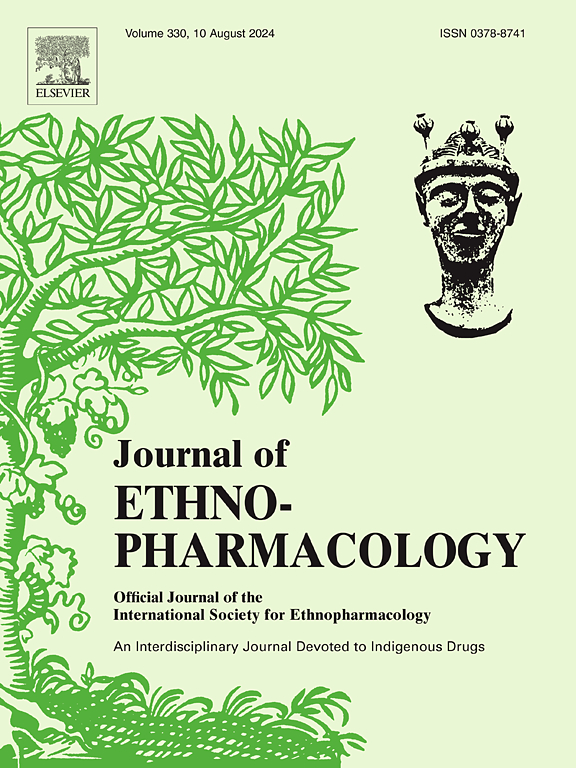Anti-rheumatic arthritis efficacy of Pueraria montana extract against type-II collagen-induced rheumatoid arthritis rat model an in vitro and in vivo assessment
IF 5.4
2区 医学
Q1 CHEMISTRY, MEDICINAL
引用次数: 0
Abstract
Ethnopharmacological relevance
Pueraria montana (PM) is a Chinese medicinal herb used to treat alcoholism, inflammation, swelling, and anti-apoptosis. However, the mechanisms and active compounds of PM remain poorly understood.
Aim of the study
Chronic inflammatory diseases such as rheumatoid arthritis (RA) can affect multiple joints. Inflammation begins in the synovium and spreads to the surrounding cartilage and bone if left untreated. This study assessed the probable anti-arthritic mechanisms of action of PM extracts. Type II collagen emulsion-induced rheumatoid used as an in vivo model.
Materials and methods
TNF-α-stimulated MC cells were used to investigate the mechanism of PM extract in RA, and the PM extract was confirmed using HPLC analysis. The antiproliferative efficacy of PM was assessed by MTT assay, and apoptotic activity was evaluated using Hoechst staining and flow cytometry assessment. Furthermore, the matrix metalloproteinase (MMP) ratio and mRNA expression of Bcl-2, Cas-3, Cas-9, and SOCS1 were determined using ELISA and qRT-PCR.
Results
PM extract treatment possesses anti-arthritic properties in CIA rats and can suppress inflammation and inhibit the invasion and migration of MH7A cells. The upregulation of Bcl-2, a recognized inhibitor of apoptotic genes, prevents the release of cyto-C into the cytoplasm. The in vivo outcomes showed that PM reduced the arthritis score and toe swelling in CIA rats. In vitro, PM extract exhibited substantial antiproliferative and pro-apoptotic properties on TNF-α-induced MH7A cell lines. The invasive and adhesive properties of MH7A cells decreased, and MMP secretion was reduced.
Conclusion
This study suggests that the PM extract possesses anti-arthritic properties in the CIA model and is an extension of the clinical treatment of rheumatic arthritis.

葛根提取物对ii型胶原诱导的类风湿性关节炎大鼠模型的抗风湿关节炎疗效及体外、体内评价。
民族药理学相关性:葛根是一种中草药,用于治疗酒精中毒、炎症、肿胀和抗细胞凋亡。然而,PM的机制和活性化合物仍然知之甚少。研究目的:慢性炎症性疾病如类风湿关节炎(RA)可影响多个关节。炎症从滑膜开始,如果不及时治疗,会扩散到周围的软骨和骨骼。本研究评估了PM提取物可能的抗关节炎作用机制。II型胶原乳剂诱导的类风湿在体内模型。材料与方法:采用TNF-α-刺激的MC细胞研究PM提取物对RA的作用机制,并采用HPLC法对PM提取物进行确证。MTT法检测PM的抗增殖作用,Hoechst染色及流式细胞术检测PM的凋亡活性。采用ELISA和qRT-PCR检测基质金属蛋白酶(MMP)比例和Bcl-2、cas3、cas9、SOCS1 mRNA表达量。结果:PM提取物对CIA大鼠具有抗关节炎作用,能抑制炎症反应,抑制MH7A细胞的侵袭和迁移。Bcl-2的上调是一种公认的凋亡基因抑制剂,可以阻止细胞c释放到细胞质中。体内结果显示,PM降低了CIA大鼠的关节炎评分和脚趾肿胀。在体外,PM提取物对TNF-α-诱导的MH7A细胞株具有明显的抗增殖和促凋亡作用。MH7A细胞侵袭性和黏附性下降,MMP分泌减少。结论:本研究提示PM提取物在CIA模型中具有抗关节炎的作用,是临床治疗风湿性关节炎的延伸。
本文章由计算机程序翻译,如有差异,请以英文原文为准。
求助全文
约1分钟内获得全文
求助全文
来源期刊

Journal of ethnopharmacology
医学-全科医学与补充医学
CiteScore
10.30
自引率
5.60%
发文量
967
审稿时长
77 days
期刊介绍:
The Journal of Ethnopharmacology is dedicated to the exchange of information and understandings about people''s use of plants, fungi, animals, microorganisms and minerals and their biological and pharmacological effects based on the principles established through international conventions. Early people confronted with illness and disease, discovered a wealth of useful therapeutic agents in the plant and animal kingdoms. The empirical knowledge of these medicinal substances and their toxic potential was passed on by oral tradition and sometimes recorded in herbals and other texts on materia medica. Many valuable drugs of today (e.g., atropine, ephedrine, tubocurarine, digoxin, reserpine) came into use through the study of indigenous remedies. Chemists continue to use plant-derived drugs (e.g., morphine, taxol, physostigmine, quinidine, emetine) as prototypes in their attempts to develop more effective and less toxic medicinals.
 求助内容:
求助内容: 应助结果提醒方式:
应助结果提醒方式:


